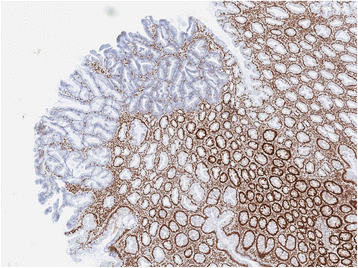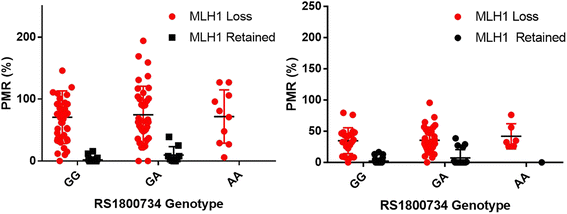MLH1-93 G/a polymorphism is associated with MLH1 promoter methylation and protein loss in dysplastic sessile serrated adenomas with BRAFV600E mutation
- PMID: 29304767
- PMCID: PMC5756376
- DOI: 10.1186/s12885-017-3946-5
MLH1-93 G/a polymorphism is associated with MLH1 promoter methylation and protein loss in dysplastic sessile serrated adenomas with BRAFV600E mutation
Abstract
Background: Sessile serrated adenomas with BRAF mutation progress rapidly to cancer following the development of dysplasia (SSAD). Approximately 75% of SSADs methylate the mismatch repair gene MLH1, develop mismatch repair deficiency and the resultant cancers have a good prognosis. The remaining SSADs and BRAF mutant traditional serrated adenomas (TSA) develop into microsatellite stable cancers with a poor prognosis. The reason for this dichotomy is unknown. In this study, we assessed the genotypic frequency of the MLH1-93 polymorphism rs1800734 in SSADs and TSAs to determine if the uncommon variant A allele predisposes to MLH1 promoter hypermethylation.
Methods: We performed genotyping for the MLH1-93 polymorphism, quantitative methylation specific PCR, and MLH1 immunohistochemistry on 124 SSAD, 128 TSA, 203 BRAF mutant CRCs and 147 control subjects with normal colonoscopy.
Results: The minor A allele was significantly associated with a dose dependent increase in methylation at the MLH1 promoter in SSADs (p = 0.022). The AA genotype was only observed in SSADs with MLH1 loss. The A allele was also overrepresented in BRAF mutant cancers with MLH1 loss. Only one of the TSAs showed loss of MLH1 and the overall genotype distribution in TSAs did not differ from controls.
Conclusions: The MLH1-93 AA genotype is significantly associated with promoter hypermethylation and MLH1 loss in the context of SSADs. BRAF mutant microsatellite stable colorectal cancers with the AA genotype most likely arise in TSAs since the A allele does not predispose to methylation in this context.
Keywords: BRAF; Colorectal cancer; Mismatch repair; Sessile serrated adenoma, CpG Island Methylator phenotype.
Conflict of interest statement
Ethics approval and consent to participate
This study was approved by the QIMR Berghofer Human Research Ethics Committee. All participants gave informed, written consent prior to participation in this study.
Consent for publication
Not applicable.
Competing interests
The authors declare they have no competing interests.
Publisher’s Note
Springer Nature remains neutral with regard to jurisdictional claims in published maps and institutional affiliations.
Figures


References
-
- Spring KJ, Zhao ZZ, Karamatic R, Walsh MD, Whitehall VLJ, Pike T, Simms LA, Young J, James M, Montgomery GW, et al. High prevalence of sessile serrated adenomas with BRAF mutations: a prospective study of patients undergoing colonoscopy. Gastroenterology. 2006;131(5):1400–1407. doi: 10.1053/j.gastro.2006.08.038. - DOI - PubMed
Publication types
MeSH terms
Substances
LinkOut - more resources
Full Text Sources
Other Literature Sources
Medical
Research Materials

